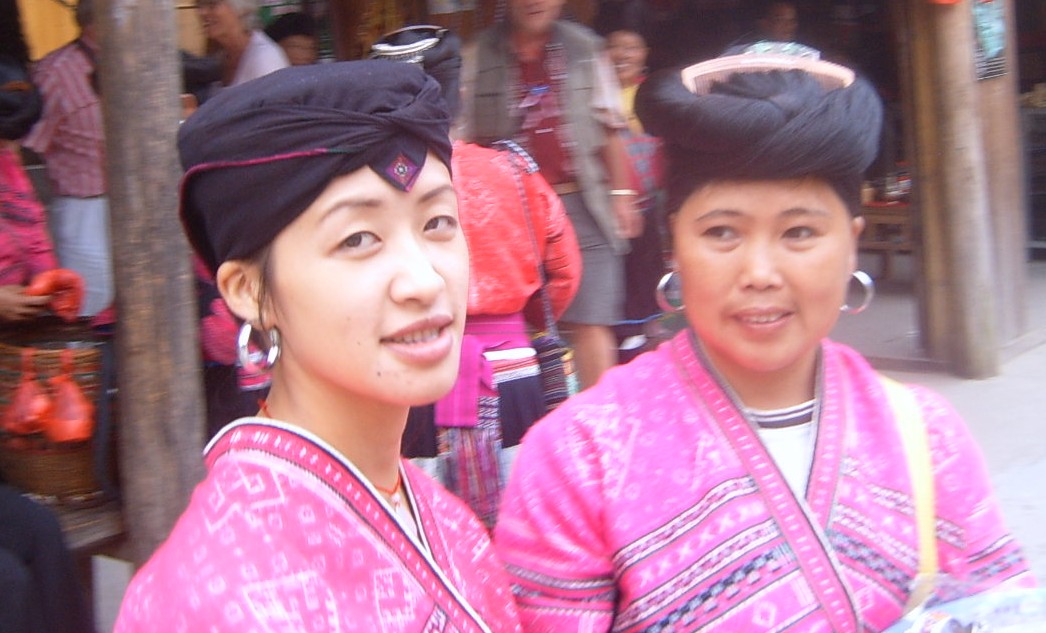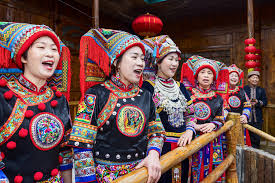Yao Peoplee
Overview of the Yao People
Spoken Regions: Primarily in southern China (Guangxi, Hunan, Yunnan), Laos, northern Vietnam, and northern Thailand
Number of Speakers: Approximately 800,000 to 1 million worldwide
Cultural Symbols and Iconography
Clothing: Women wear predominantly black outfits decorated with red, white, and green embroidery, along with heavy silver jewelry
Symbolic Patterns: Embroidery often features spirals, birds, dragons, and suns representing cosmology and ancestor worship
Ritual Elements: Taoist-derived symbols, talismans, and paper effigies are widely used in ceremonial practices
Language
Yao (Iu Mien / Yao Language)
anguage Family: Hmong-Mien family
Language Name: Internationally known as "Iu Mien," or simply "Yao language"
Linguistic Features
・Tonal language (6 to 8 tones distinguish meaning)
・Predominantly monosyllabic words, SVO word order
・No grammatical gender or number; grammatical relations indicated by word order and particles
・Sentence-final particles and word repetition convey respect and nuance
Script
Writing System
Traditional Writing
No indigenous script; religious texts and rituals use Chinese characters through phonetic transcription and semantic borrowing (a practice sometimes called "pseudo-scripture")
Latin-Based Script:
・Recently standardized as the Iu Mien Unified Romanized Alphabet
・Tones marked numerically at the end of syllables (e.g., "mienh2" for "person")
・Nasalization and consonant variation may be indicated with diacritics
Common Expressions and Greetings (in Iu Mien)
| English | Iu Mien | Pronunciation |
| Hello | Nyei zoux | Nyei zou |
|---|---|---|
| How are you? | Nyei zoux maiv? | Nyei zou maiv? |
| Yes | Mienh | Mien |
| Goodbye | Goux daaih | Gou daai |
| My name is... | Gou mangz... | Gou mang (your name) |
Note: Tone and vocabulary may vary across regions and dialects.
Region
Continent: Asia
Region: Primarily in southern China (Guangxi, Hunan, Yunnan), Laos, northern Vietnam, and northern Thailand
Access Guide
The currency of the Yao people is the Chinese Yuan (CNY, 元).
The currency shown here is the official currency (CNY) of China, where the Yao people mainly live. Different currencies may be used in other countries.
the Yao People Region
Example routes to the Yao People (Kunming, Yunnan, China)
| Departure City | Direct/Transit | Arrival Airport | Flight Time (approx.) | Reference Fare (one-way/round-trip, Economy) |
| Los Angeles | LA → via Shanghai/Beijing/Hong Kong → Kunming | Kunming Changshui Int'l (KMG) | About 18–27 hr | US$700–1,200 |
|---|---|---|---|---|
| New York | NY → via Shanghai/Beijing → Kunming | Kunming Changshui Int'l (KMG) | About 18–26 hr | US$900–1,500 |
| London | London → via Beijing/Shanghai → Kunming | Kunming Changshui Int'l (KMG) | About 17–25 hr | £500–850 |
| Tokyo | Tokyo → via Hong Kong/Shanghai → Kunming | Kunming Changshui Int'l (KMG) | About 9–14 hr | ¥60,000–120,000 |
| Sydney | Sydney → via Guangzhou/Hong Kong → Kunming | Kunming Changshui Int'l (KMG) | About 15–22 hr | A$700–1,200 |
| Hong Kong | Hong Kong → Kunming (direct or via Guangzhou) | Kunming Changshui Int'l (KMG) | About 2.5–5 hr | HK$1,800–3,800 |
| Shanghai | Shanghai → Kunming (direct) | Kunming Changshui Int'l (KMG) | About 3.5–5 hr | CNY1,600–2,500 |
| Singapore | Singapore → via Guangzhou/Hong Kong → Kunming | Kunming Changshui Int'l (KMG) | About 7–12 hr | S$550–900 |
Language Origins and Historical Background
Historical Origins of the Language
・The Hmong-Mien languages originated in the mountainous regions of southern China and are closely tied to ethnic distributions south of the Yangtze River
・The Yao people have been documented since the Han dynasty and have formed multiple subgroups through interaction and conflict with the Han Chinese
・Religiously syncretic with Taoism, leading to the development of ritual language and chanted traditions
・Migration to Southeast Asia accelerated in the 19th–20th centuries due to displacement and resettlement, resulting in today’s multi-national distribution
Traditional Games
Children’s Games
・Spinning top games with string or stick-balancing challenges using bamboo
・Tag and hide-and-seek (sometimes themed with mythic creatures like monkey spirits or ancestral ghosts)
・Rhythmic call-and-response games accompanied by singing
Adult & Ritual-Based Games:
・New Year’s "Ancestor Calling Games," combining song and dance to invite spirits
・Imitative archery (string-pulling games) and shuttlecock-style feather kicking
・Male dance battles performed as improvised contests of movement and music
Introduction video


Note
Many games are deeply linked to ritual, blending humor with reverence.
